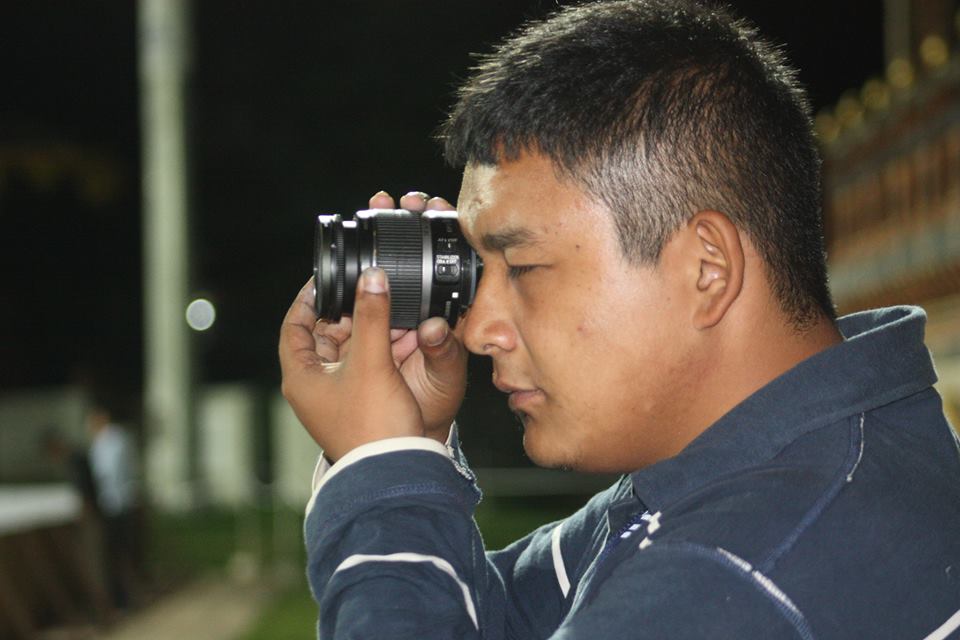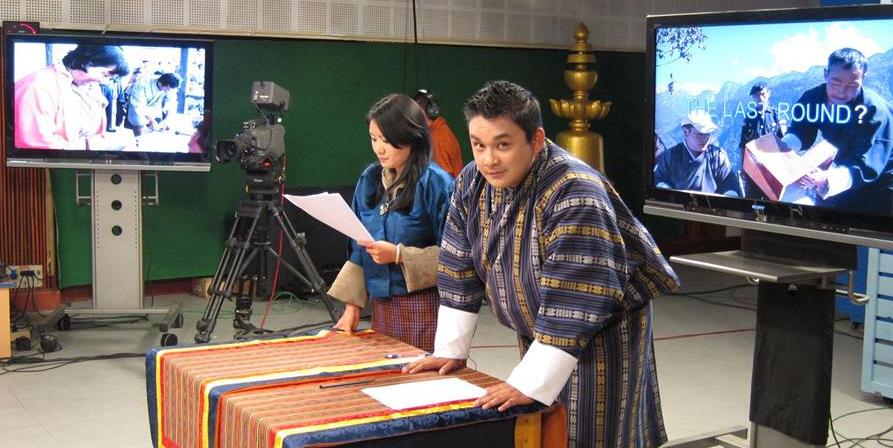Journalists@Work: Tenzin Rabgye
 Tenzin Rabgye is a television reporter and news anchor in the tiny mountainous kingdom of Bhutan, which is tucked into the Himalayas between India and China. The 25-year old journalist works for the country’s public broadcaster, Bhutan Broadcasting Service (BBS). Television and the Internet weren’t legalized until 1999 in Bhutan, making it one of the last country’s in the world to do so. Before that, the only media in the country were a state-owned newspaper and BBS radio. Despite this, social media has rapidly grown and now plays a major role in Tenzin’s daily work – In fact, he responded to my Facebook request for an interview within a minute of me messaging to him.
Tenzin Rabgye is a television reporter and news anchor in the tiny mountainous kingdom of Bhutan, which is tucked into the Himalayas between India and China. The 25-year old journalist works for the country’s public broadcaster, Bhutan Broadcasting Service (BBS). Television and the Internet weren’t legalized until 1999 in Bhutan, making it one of the last country’s in the world to do so. Before that, the only media in the country were a state-owned newspaper and BBS radio. Despite this, social media has rapidly grown and now plays a major role in Tenzin’s daily work – In fact, he responded to my Facebook request for an interview within a minute of me messaging to him.
Tenzin works in English and Dzonghka, the main language of Bhutan. He also speaks several dialects as well as Nepali – useful skills when reporting from Bhutan’s numerous remote areas.
What do you like most about being a journalist in Bhutan?
Every day is a different adventure. You go out to the scene and you meet all sorts of different people from people in the streets to people in high places and officials. And you get this feeling for people’s different lives and what people are going through in the places that you go and visit. So it is not a boring job and that is what I really love about it.
Bhutan is mainly made up of steep and incredibly high mountains though. How do you get out to report then?
BBS has official cars and sometimes I drive my own car when I go out. Of course, when you travel, you have all sorts of winding roads high up in the mountain and sometimes they are very scary. Most of the highways aren’t too bad but many of the more remote areas are not paved and there’s a chance of falling boulders. In a lot of areas, when it rains a bit, such as in the monsoon period, there are landslides. So it isn’t always easy.
Is there anything that you really dislike about your job?
Sometimes it can be very difficult to get people to talk to you. The media is very new in Bhutan and people, especially officials, are very difficult to talk to and that can be challenging and demoralizing as well.
Can you give me an example?
For example, say I want to talk to someone about something even very simple like problems of garbage, people will talk to you off camera but not on camera. They fear that there might be repercussions against them. It is the same, even with officials: they are worried that by talking to you they might get into trouble.
In your culture, respect towards the elderly plays a big role but you are very young. Does this make it even more difficult for people to talk to you?
Actually no, people are very friendly, they invite you to their homes and they are very welcoming. They have no problems and there is no aggression so age is not really a problem.
As you just said, Bhutan doesn’t have a long history of media. How do people see journalists?
I have this feeling that a lot of people respect what journalists do and that people turn to us for information or for awareness about certain issues. We are looked to by ordinary people who feel that they can rely on us on if they have problems which need to be brought out in the open.
What about social media. What role does it play at work?
When I come to work, the first thing I do is to sign into Facebook. I read the links from friends on Facebook so it plays a big role in finding stories. It is also really good for contacting people for work. I’m not so good at Twitter but I use Facebook to get a lot of information and also to get out information out to colleagues. Then I check the online editions of some of the papers here in Bhutan and I also look at other online news. I listen to BBC on the Internet.
What about traditional media?
I mainly look at e-papers but I listen to the local radio station when I am driving. At home, I watch a lot of BBC, CNN and Al Jazeera.
What is the most interesting story you have worked on?
I did a TV feature about a person with HIV. Pema Dorji was one of the first to be diagnosed with HIV in Bhutan and he went through a lot because of this. He was preparing for the Tour of the Dragon, which is a one day mountain bike race in Bhutan and its incredibly tough. I did the story in such a way that he told the story, which is not usually done on television here. It was just him who talked and he tells the story of how it was finding out he was HIV positive, the struggles he had and how he overcame these struggles. It shows his journey to train for the race and how much more healthy he is now that he was before. Dorji wants to show people that just because you have HIV, it doesn’t mean you have to be sad and depressed the whole time. And the report sent a very strong message out to people.
Has there been another story that you have done that really affected or touched you in some way?
I did a story last year about healthy ageing. While I was working on the story, I met this old couple in the capital Thimphu who had no kids. The man was 79 and his wife was much older and she couldn’t do any work anymore. They had an adoptive daughter who brought them things sometimes but otherwise they didn’t have anyone to look after them. After I did the story, I kept visiting then and from time to time I take them rations. If I see one of them passing by, I talk to them and see what they need. So that story sort of made me change the way that I look at life.
What is your dream for the future as a journalist?
Right now I am based in the capital, Thimphu. I have this dream that I would like to travel more to the remote areas of Bhutan and show the how people are living and highlight their problems and see if we can get some of them solved. I believe that even if I can make a small difference for one or two communities, that will be good enough for me.
Interview: Kate Hairsine





Feedback